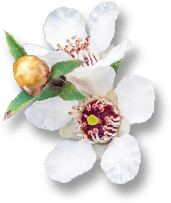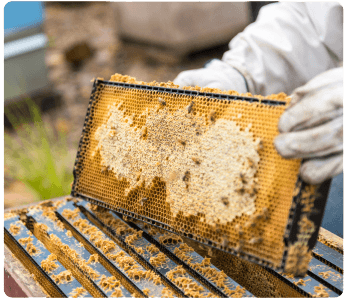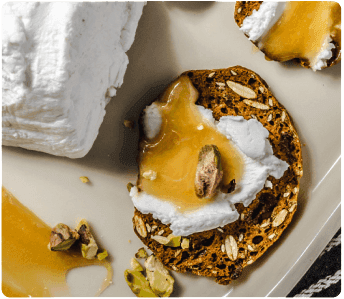Your cart is currently empty!
Manuka Honey
Our Products
-
Mānuka Honey MGO 970+
US $138.00
-
Mānuka Honey MGO 970+ 2-box pack
US $248.40
A National Treasure from
New Zealand’s Wilderness
Vitahouse™ Mānuka Honey MGO 970+ is sourced from the remote, pristine alpine regions of New Zealand, far from human activity and environmental pollution. The rugged terrain makes traditional access nearly impossible — so we rely on helicopters to transport our team and equipment for harvesting. This complex, high-cost process is something only a few can achieve, adding to the rarity and value of our honey.
What makes it even more special? The Mānuka flower blooms for just six weeks a year, making every drop of honey truly limited and precious.
From beekeeping and harvesting to processing and packaging, the Vitahouse™ team oversees every step in-house. This allows us to maintain exceptional quality control and ensure every jar is pure, safe, and trustworthy.
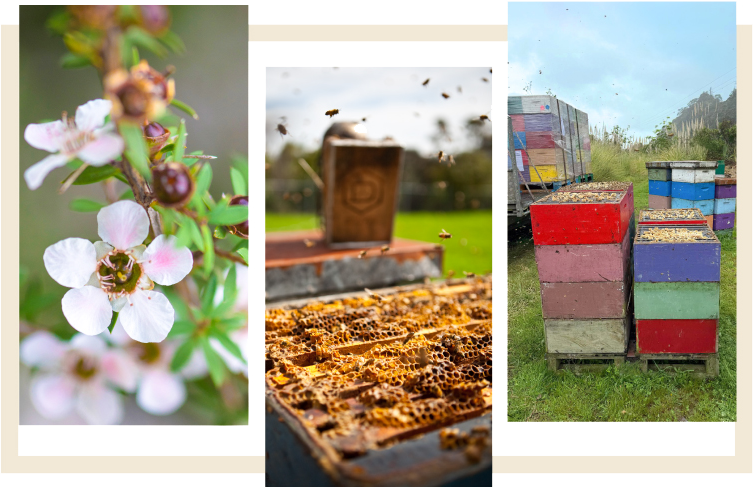
 Fun Fact
Fun Fact
Our beehives are specifically colour-coded, allowing bees to recognize and return to their own hives accurately. This helps improve the quality of the honey.

What Is Mānuka Honey?
Mānuka honey is a natural honey produced by bees that collect nectar from the flowers of the Mānuka tree (Leptospermum scoparium), which is native to New Zealand and parts of Australia. The bees store and process the nectar in their hives, creating honey with a distinct flavour and naturally occurring methylglyoxal (MGO). Mānuka honey is commonly used as a sweetener and as an ingredient in food and personal care products.
What is Methylglyoxal (MGO)?
Methylglyoxal (MGO) is a naturally occurring compound in Mānuka honey that forms when dihydroxyacetone (DHA), a substance found in the nectar of Mānuka flowers, converts into MGO during the honey’s maturation process.* Mānuka honey on the market comes with varying MGO levels — the higher the concentration, the stronger its antibacterial and anti-inflammatory properties.
*Source: Hossain, Md Lokman, et al. Monitoring the Release of Methylglyoxal (MGO) from Honey and Honey-Based Formulations Using a Franz Diffusion Cell. National Center for Biotechnology Information, 2023, https://www.ncbi.nlm.nih.gov/pmc/articles/PMC10051060/.
Why Choose

Vitahouse™ Mānuka Honey MGO 970+ is sourced from beehives located in the remote, mountainous regions of New Zealand, where Mānuka trees grow naturally. It is carefully harvested and processed in high-standard facilities designed specifically for Mānuka honey production. Our honey meets strict New Zealand quality and purity standards and is produced in compliance with food safety regulations.
5 Key Features
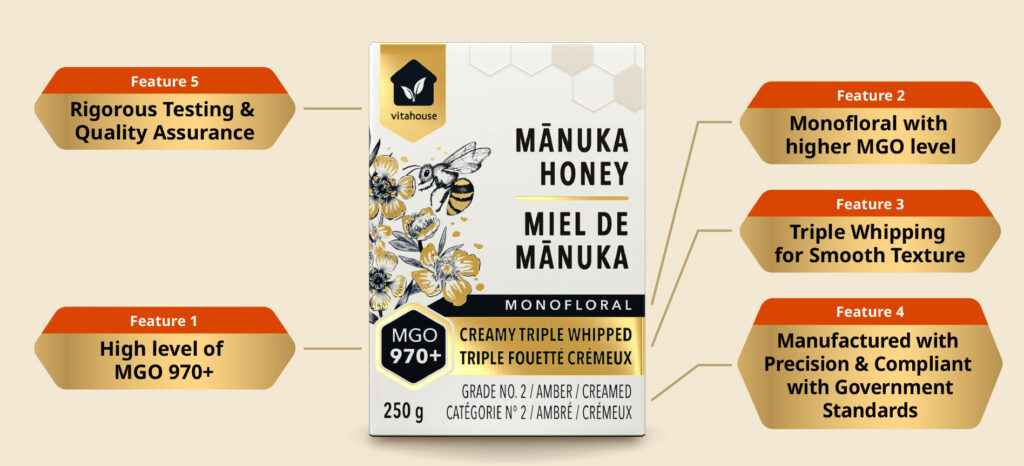

Feature 1
High level of MGO 970+
Vitahouse™ Mānuka Honey MGO 970+ contains MGO levels of 970+, making it a highly concentrated source of methylglyoxal (MGO). The MGO content is closely associated with its unique antibacterial properties and serves as a key indicator of its quality.
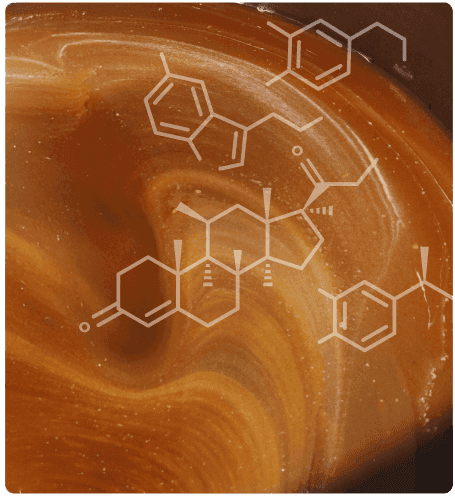
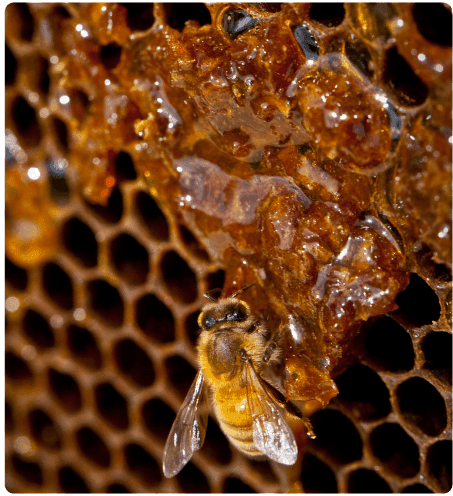

Feature 2
Monofloral with 
higher MGO level
Mānuka honey on the market is generally classified into two types: monofloral and multifloral.
Monofloral Mānuka honey is primarily derived from the Mānuka tree. It typically contains a higher concentration of MGO, offering a richer, more distinctive flavour with pronounced herbal notes. Multifloral Mānuka honey, on the other hand, is a blend of nectar from Mānuka flowers and other floral sources, with the ratio varying by brand.
Since multifloral Mānuka honey contains other types of nectar, it generally has a lower concentration of Mānuka components and a reduced MGO level, making its benefits less potent compared to monofloral varieties.
Vitahouse™ Mānuka Honey MGO 970+ is a monofloral honey made from 100% Mānuka nectar. It features a bold, distinctive flavour, rich aroma, and a high MGO content.
Feature 3
Triple Whipping for Smooth Texture
Triple Whipping is our unique processing technique designed to give the honey a smoother, creamier texture. After filtration and cooling, the honey is transferred to a specialized device where it is continuously churned for over 72 hours to achieve the Creamy Triple Whipped effect.
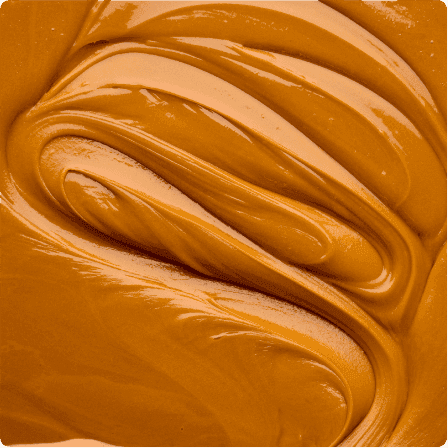
Feature 4
Manufactured with Precision & Compliant with Government Standards
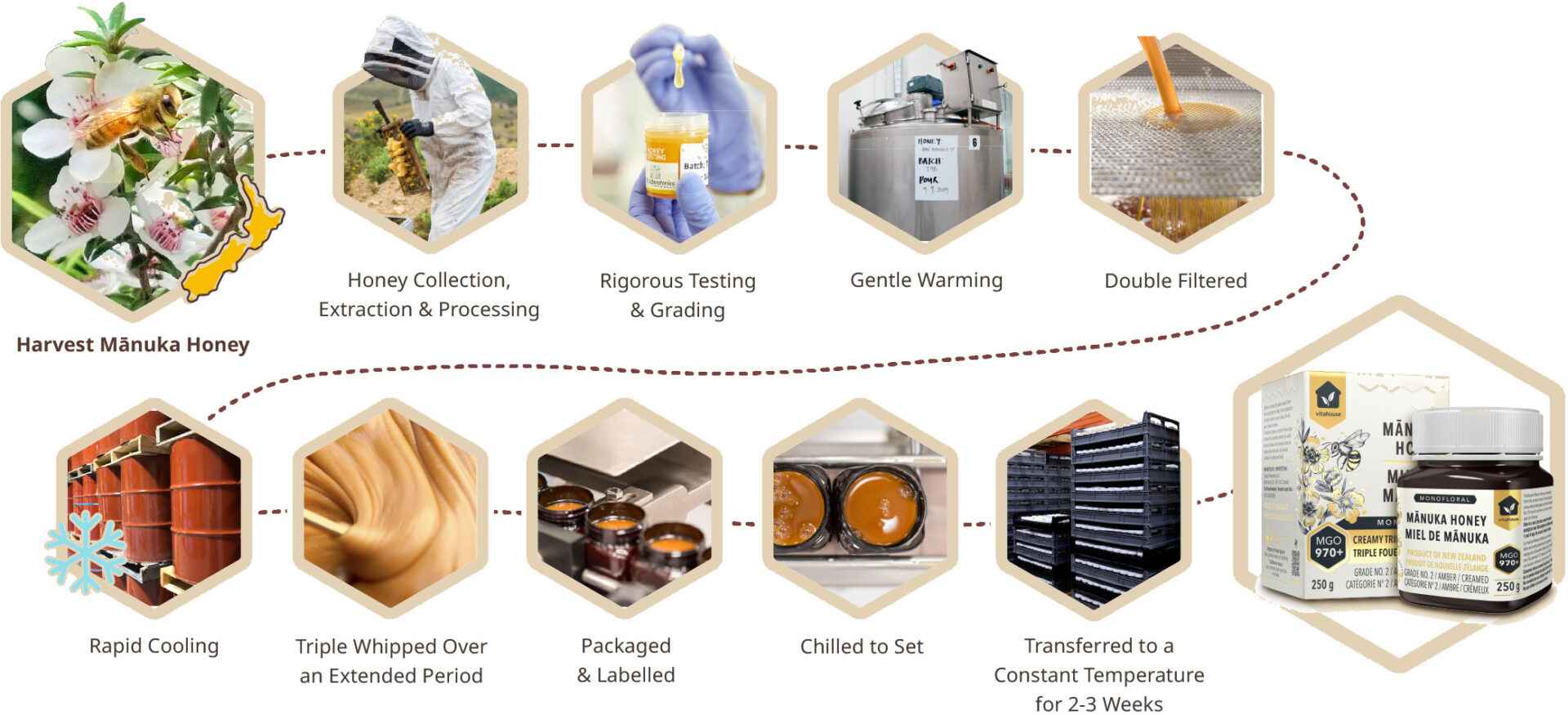
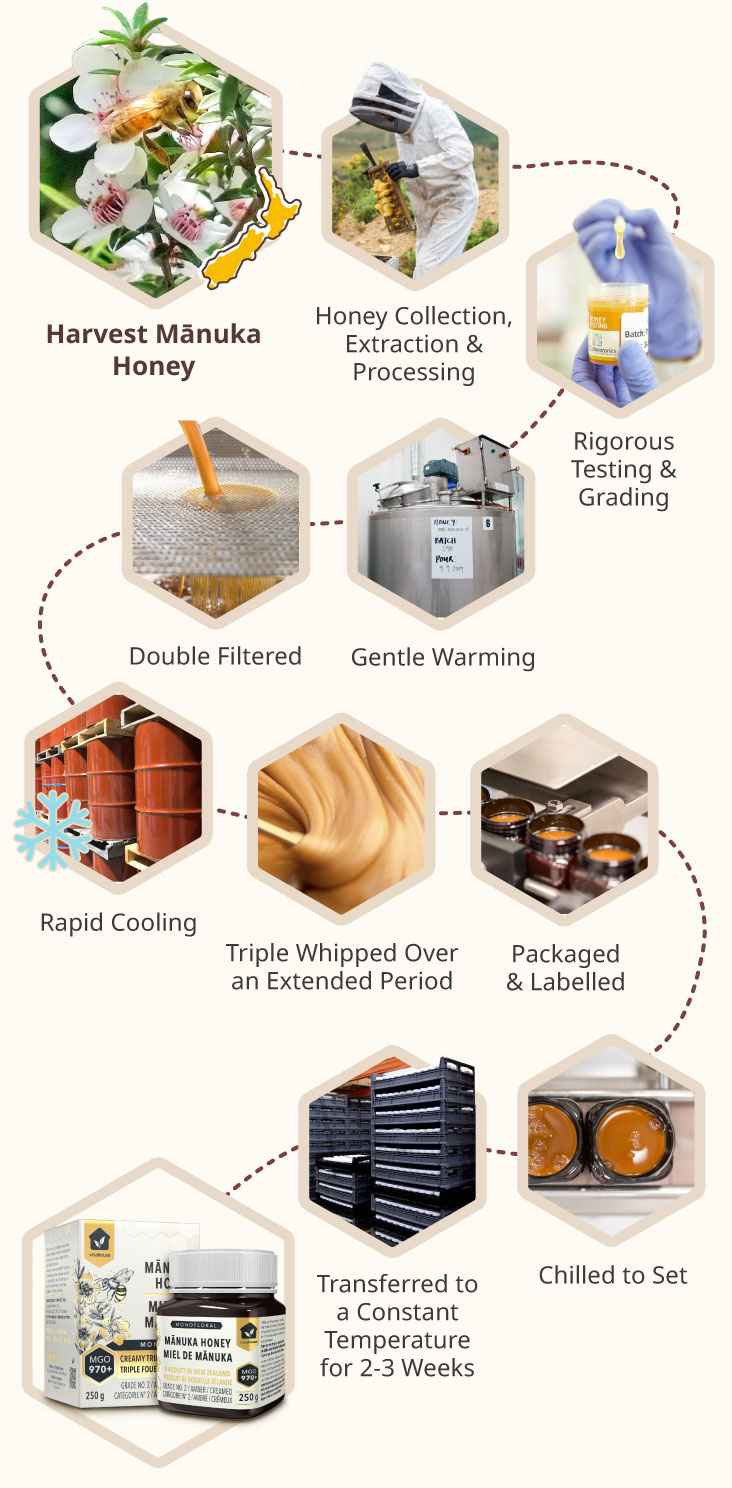
Feature 5
Rigorous Testing & Quality Assurance
The product is tested by accredited laboratories to ensure it meets the standards set by New Zealand’s Ministry for Primary Industries (MPI), the government agency responsible for regulating food safety, agriculture, and biosecurity. MPI establishes the criteria for authentic Mānuka honey through its scientific definition and classification system.

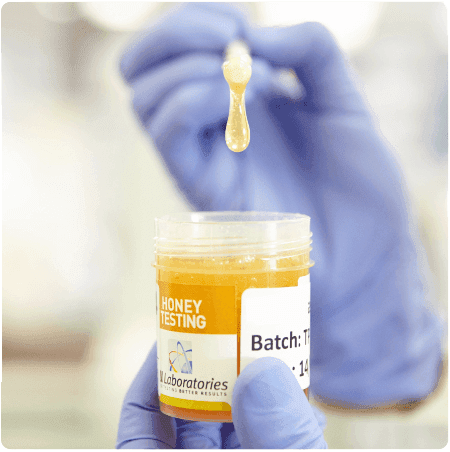
What’s in the Box
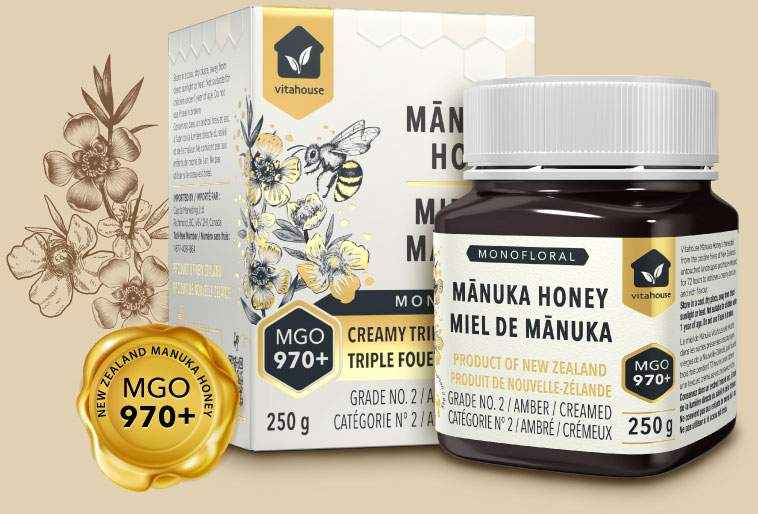
Vitahouse™ Mānuka Honey MGO 970+
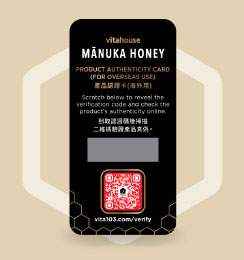
Product Authenticity Card
Each bottle of Vitahouse™ Mānuka Honey MGO 970+ includes a product authenticity card with a unique verification code. Customers can verify the product’s authenticity online by checking the code on our website: vita103.com/verify
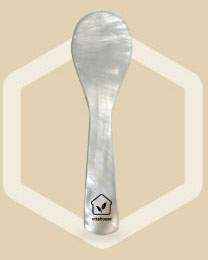
Mother-of-Pearl Spoon
Each bottle of Vitahouse™ Mānuka Honey MGO 970+ comes with a beautifully crafted mother-of-pearl spoon, offering a convenient and elegant way to enjoy Mānuka honey while preserving its natural properties and quality.
Cautions for using mother-of-pearl spoons
- If you are allergic to shellfish, exercise caution, as mother-of-pearl spoons are made from shell material.
- Handle the spoon gently, as it is fragile and may develop sharp edges if broken or dropped.
- Keep out of reach of children, as the spoon could pose a choking hazard or cause injury if broken or dropped.
- Not safe for dishwasher use. Hand wash only to preserve its quality and prevent damage.
Product Features of Vitahouse™ Mānuka Honey MGO 970+
![]() Pure and Uncontaminated
Pure and Uncontaminated
![]() Raw, Wild & Unpasteurized
Raw, Wild & Unpasteurized
![]() Monofloral Mānuka Honey
Monofloral Mānuka Honey
![]() High MGO Level
High MGO Level
![]() Rigorous Manufacturing Procedures
Rigorous Manufacturing Procedures
![]() Triple Whipping
Triple Whipping
![]() Meets New Zealand’s MPI Standard
Meets New Zealand’s MPI Standard
![]() Product Authenticity Card
Product Authenticity Card
![]() Mother-of-Pearl Spoon
Mother-of-Pearl Spoon
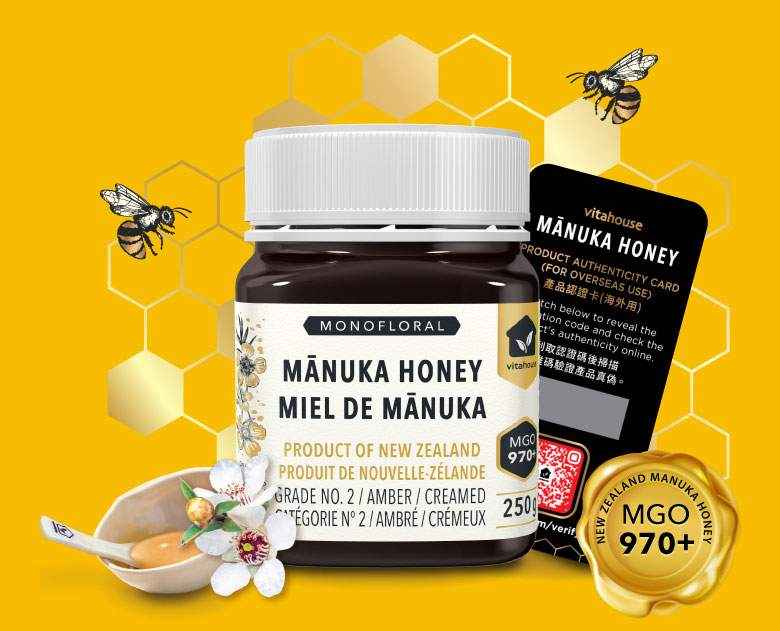
How to Use Mānuka Honey?

Direct Consumption
Enjoy a teaspoon of Mānuka honey daily as part of a balanced diet. Allow it to dissolve slowly in your mouth to fully appreciate its natural flavour.
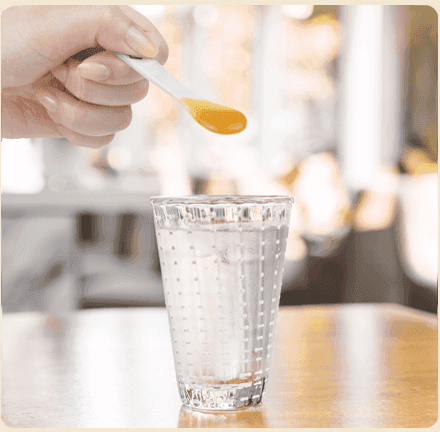
Add to Beverages
Stir Mānuka honey into warm water, tea, smoothies, or other drinks. However, avoid exposing it to excessive heat to preserve its natural properties.

As a Sweetener
Use Mānuka honey as a natural alternative to sugar in recipes. To maintain its original texture and flavour, avoid prolonged exposure to high heat.
![]() Warnings:Honey is not suitable for infants under one year of age. Avoid consumption if you are allergic to bee products. If you have any health concerns or are taking medications, consult a healthcare professional before consumption.
Warnings:Honey is not suitable for infants under one year of age. Avoid consumption if you are allergic to bee products. If you have any health concerns or are taking medications, consult a healthcare professional before consumption.
The MGO Level of Vitahouse™ Mānuka Honey MGO 970+
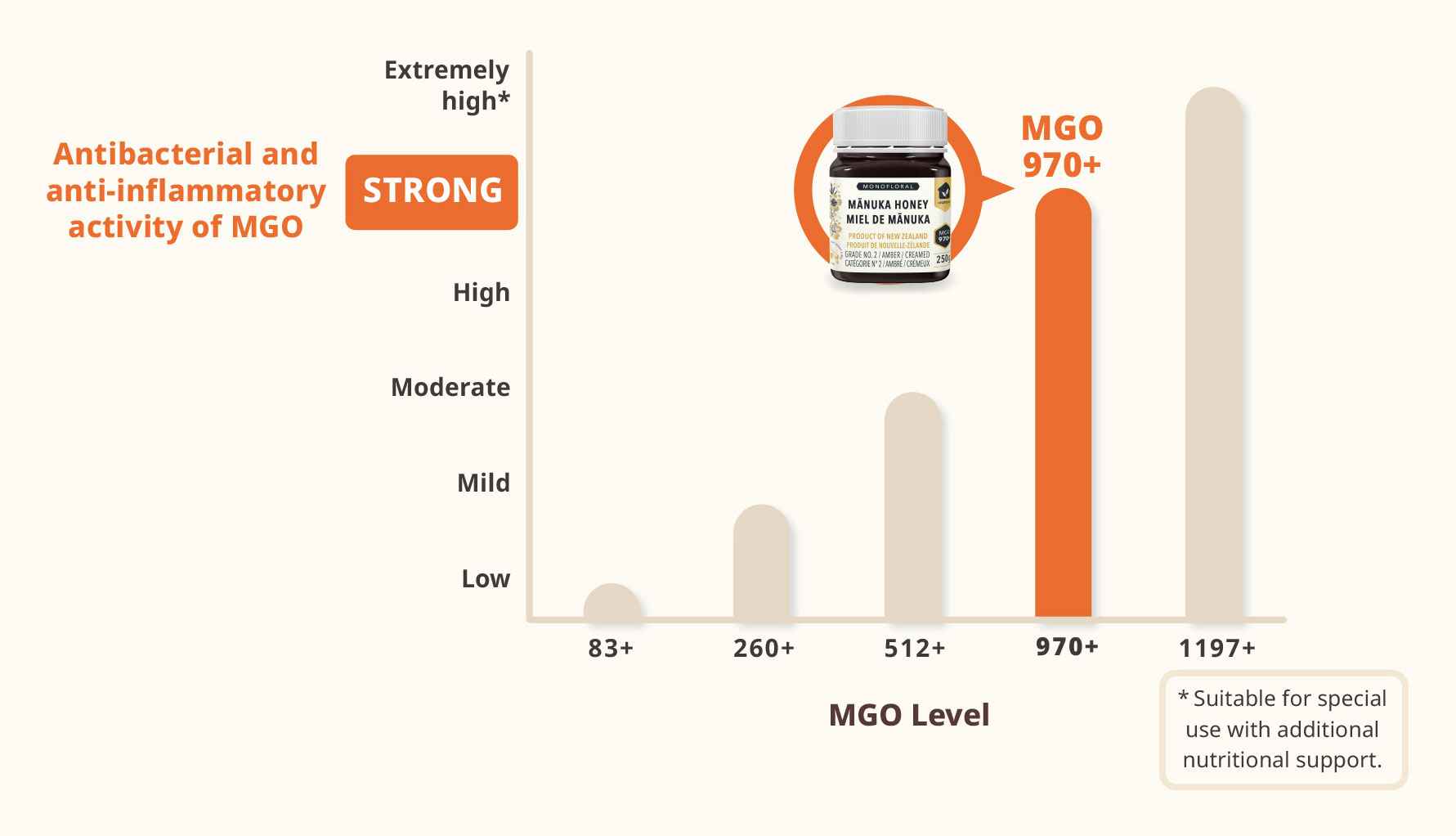
Methylglyoxal (MGO) Levels
The Methylglyoxal (MGO) level indicates the concentration of MGO in Mānuka honey. The higher the MGO level, the greater the concentration of this key compound, which is linked to the honey’s antibacterial and anti-inflammatory properties. Vitahouse™ Mānuka Honey MGO 970+ contains at least 970 MGO, representing a high concentration.
UMF (Unique Mānuka Factor) is another grading system for Mānuka honey that measures MGO and other compounds.
MGO vs UMF Comparison Table
| MGO Level | Corresponding UMF Rating | Antibacterial activity | Description * |
|---|---|---|---|
| 83+ | 5+ | Low | Suitable for use as a natural sweetener that supports a healthy lifestyle. |
| 260+ | 10+ | Mild | |
| 512+ | 15+ | Moderate | Suitable for everyday health and wellness support. |
| 826+ | 20+ | High | |
| 970+ | 22+ | Strong | Supports immune function, digestive system, and gut health. |
| 1197+ | 25+ | Extremely high | Suitable for special use with additional nutritional support. |
*Note:These statements have not been evaluated by the Food and Drug Administration or Health Canada. This product is not intended to diagnose, treat, cure, or prevent any disease. Always consult a healthcare professional before making any health-related decisions.
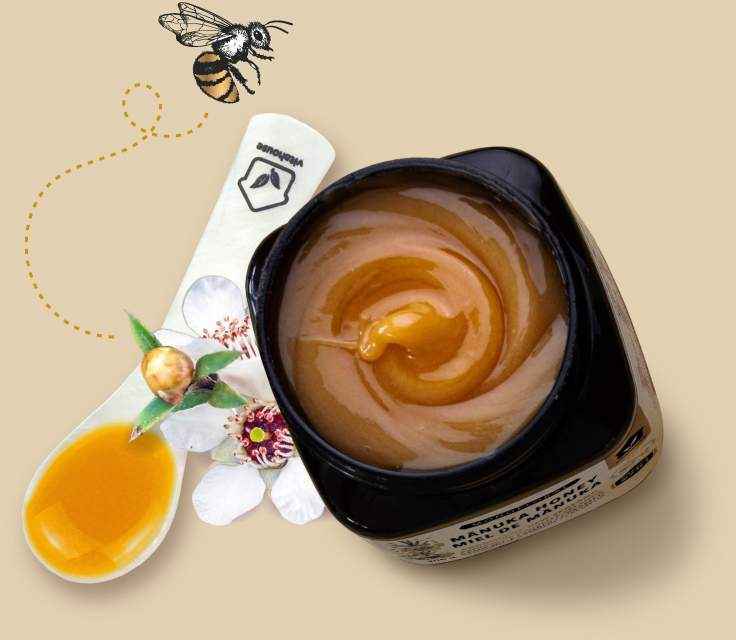
Frequently Asked Questions
Why is Mānuka honey more expensive?
Mānuka honey is more expensive due to several factors that affect its production. The Mānuka tree (Leptospermum scoparium) grows in limited regions, primarily in New Zealand, and has a short flowering period, which restricts the amount of nectar available for honey production each year. Additionally, the narrow distribution of the Mānuka tree makes it more challenging for bees to collect nectar, increasing the difficulty and cost of harvesting. The production process also involves strict quality control, selection, and laboratory testing to verify the honey’s authenticity and classification. The combination of limited supply, labor- intensive harvesting, and rigorous testing contributes to its higher price.
What is Methylglyoxal (MGO) in Mānuka honey?
MGO is a naturally occurring compound in Mānuka honey that contributes to its distinct characteristics and natural antibacterial properties. The MGO concentration, often listed on the label, helps classify and assess the honey’s composition and quality.
Is all Mānuka honey monofloral?
Mānuka honey can be classified as either monofloral or multifloral, depending on the nectar sources collected by bees. Monofloral Mānuka honey is primarily derived from the Mānuka tree (Leptospermum scoparium) and typically contains higher concentrations of MGO, resulting in a stronger flavour. Multifloral Mānuka honey is made from nectar collected from a mix of flowers, including the Mānuka tree and other plant species, leading to a milder taste and lower MGO levels.
Has Vitahouse™ Mānuka Honey MGO 970+ undergone pasteurization?
No, good quality Manuka honey is not pasteurized. We keep our Mānuka Honey raw and unheated, retaining its natural beneficial compounds. Pasteurization uses heat, which breaks down these heat-sensitive nutrients, lessening Mānuka Honey’s potency and unique properties.
Who should not consume Mānuka honey?
Infants under one year old should not consume honey due to potential health risks. Additionally, individuals with allergies to bee products should avoid Mānuka honey. If you have dietary restrictions or are taking medications, consult a healthcare professional before adding Mānuka honey to your diet.
Can diabetics use Mānuka honey?
Mānuka honey, like all honey, contains natural sugars. Individuals who need to manage their blood sugar levels should consult a healthcare professional before consuming it to determine an appropriate amount based on their dietary needs.
Can I eat Mānuka honey every day?
Mānuka honey can be enjoyed daily as part of a balanced diet, but it should be consumed in moderation due to its natural sugar content. Incorporating it in appropriate amounts can complement your dietary choices. If you have specific health concerns or dietary restrictions, consult a healthcare professional.
Will heat destroy the nutrients in Mānuka honey?
Adding honey to warm tea will not immediately destroy its nutritional properties. However, prolonged exposure to high temperatures can affect natural components, such as MGO (Methylglyoxal). To preserve the honey’s beneficial properties, it is advised to avoid exposing Mānuka honey to very high temperatures.
Do I need to refrigerate Mānuka honey after opening?
Mānuka honey should be stored in a cool, dry place and away from direct sunlight or heat. There is no need to refrigerate it. Keeping it in a sealed container will help maintain its quality and prevent moisture absorption.
Is Mānuka honey safe to consume if it hardens or crystallizes?
Mānuka honey may naturally harden or crystallize over time, but this does not mean it has expired. As long as it has been stored correctly, it is still safe to consume and can be kept for a long period. If desired, you can gently warm the honey to return it to its original consistency.
Is Mānuka honey beneficial for arthritis?
Mānuka honey is known for its natural anti-inflammatory and antioxidant properties, which are attributed to its unique bioactive compounds, such as methylglyoxal (MGO). Some studies, such as the review article Therapeutic Potential of Bioactive Compounds in Honey for Treating Oste-oarthritis (Martinez-Armenta et al., 2021), suggest that honey, including Mānuka honey, may help support joint health by reducing inflammation and providing antioxidant benefits.
Additionally, the study Characterization of Immunomodulatory Responses Induced by Mānuka Honey (Masad et al., 2022) suggests that Mānuka honey may influence immune system re-sponses, contributing to overall inflammatory balance.
However, it is important to note that these studies have not been reviewed or approved by the U.S. Food and Drug Administration or Health Canada for the treatment or prevention of arthritis or related conditions. Mānuka honey is not intended to diagnose, treat, cure, or prevent any disease.
Can Mānuka honey help aid digestive and gut health?
Mānuka honey may support digestive health by promoting a healthy gut balance. Studies, such as the one titled Effect of honey in improving the gut microbial balance, have shown that honey can promote probiotic growth while reducing the presence of pathogens, thus improving gut microbiome balance. The antimicrobial properties of Mānuka honey, especially its ability to combat gut pathogens like Escherichia coli and Salmonella, can contribute to digestive health by reducing harmful microbial growth. This study on Mānuka Honey’s Effects on Pathogens and Probiotics also highlights that Mānuka honey significantly inhibits the growth of harmful pathogens while promoting the growth of beneficial probiotics.
However, it is important to note that these studies have not been reviewed or approved by the U.S. Food and Drug Administration or Health Canada. Mānuka honey is not intended to diag-nose, treat, cure, or prevent any disease.
Why should I use a mother-of-pearl spoon for Mānuka honey?
Using a mother-of-pearl spoon for Mānuka honey is recommended because it does not react with the honey’s natural properties, preserving its taste, texture, and quality. Unlike metal spoons, which can alter the honey’s composition, or plastic spoons, which may absorb odours, a mother-of-pearl spoon ensures the honey remains pure.
CAUTION:
- If you have a shellfish allergy, exercise caution, as the spoon is made from shell material.
- Handle the spoon gently as it is fragile and may develop sharp edges if broken.
- Avoid using the dishwasher, wash it gently by hand with mild soap and lukewarm water.
- The spoon is not recommended for use by young children due to its fragility.
How do I verify the authenticity of Vitahouse™ Mānuka Honey MGO 970+ that I purchased?
Each box of Vitahouse™ Mānuka Honey MGO 970+ comes with a signature authenticity card, featuring a unique verification code. To ensure the product’s authenticity, gently scratch to reveal the code and visit vita103.com/verify. Each code is one-of-a-kind and can only be verified once. Upon successful verification, the code will be marked as used, confirming that your product meets Vitahouse’s uncompromising standards of quality and integrity.
Disclaimer: The information provided on this page and website has not been evaluated by the U.S. Food and Drug Administration (FDA) or Health Canada. This product is not intended to diagnose, treat, cure, or prevent any disease.
Store Information
1-877-408-1864
Business Hours:
Call us toll-free (USA & Canada): Monday to Friday from 9am – 5pm PST.










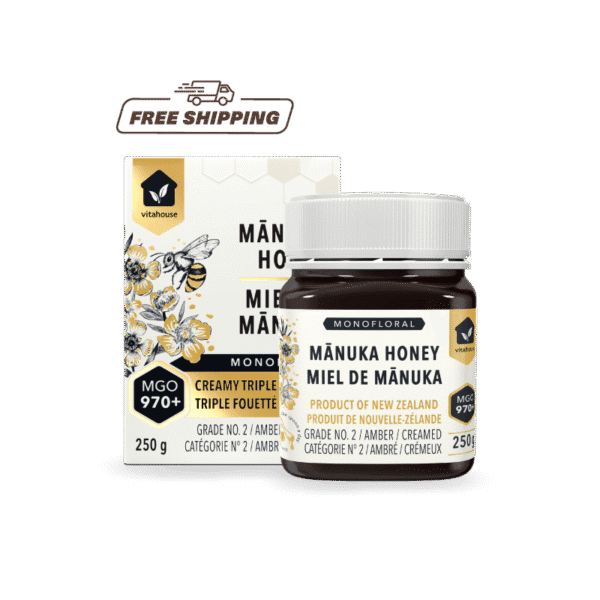
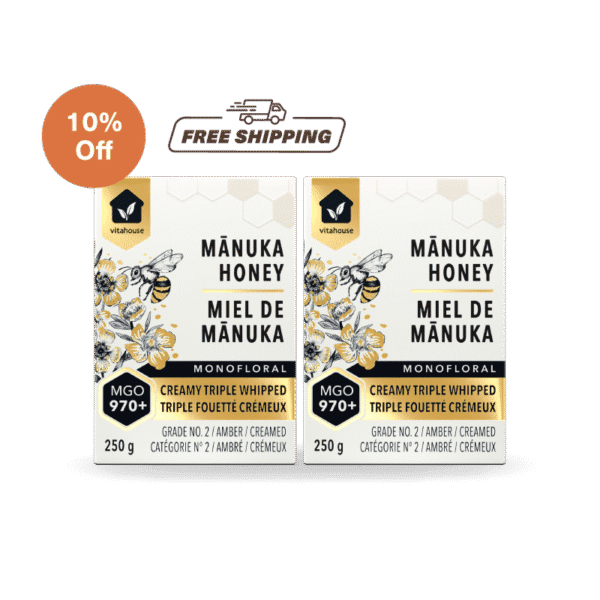
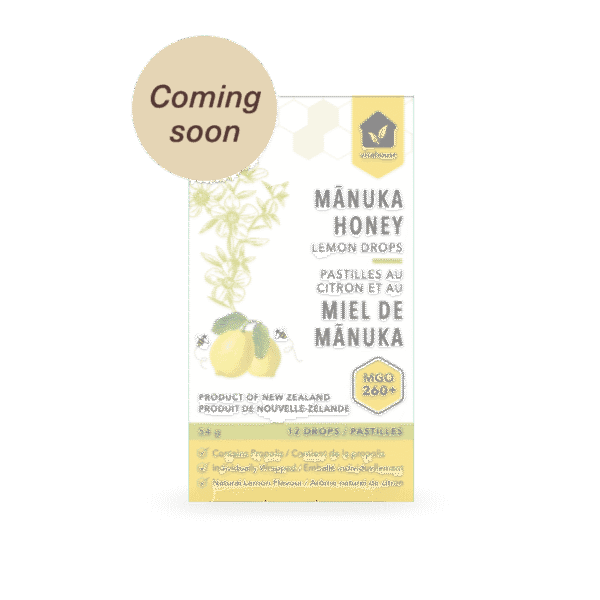
 Fun Fact
Fun Fact